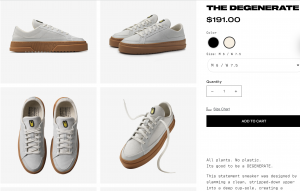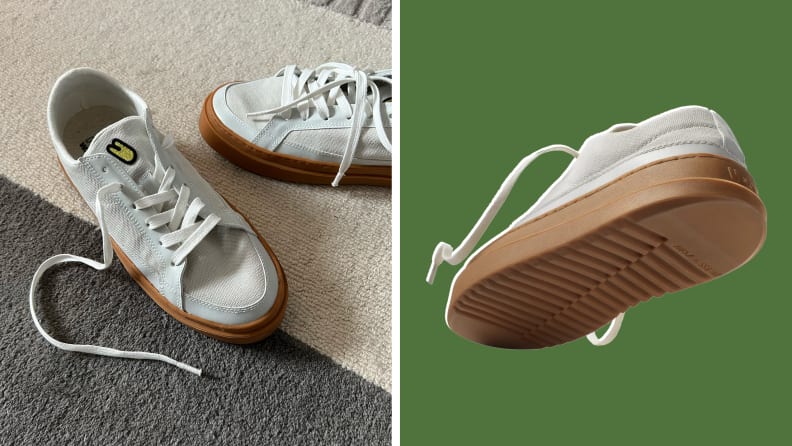How can consumers save the planet while still looking fashionable?
To answer this question, many have looked to solutions such as thrift shopping, reusing and repairing textiles, and even renting out clothing for special occasions. Unless Collective has taken on this challenge and dedicated its business model to creating plant-based streetwear designed to leave zero plastic waste. Their mission of redefining sustainable fashion materials enabled them to develop The Degenerate, the first regenerative sneaker. The Degenerate is made out of natural materials such as TUNERA™ (a natural foam rubber heel cushioning), PLIANT™ (a natural rubber outsole), MIRUM® (a plastic-free, plant-based leather), CLARUS® (a high-performance plastic-free, recycled cotton), and a coconut fiber inlay sole. This shoe was produced using cutting-edge plant-powered technology in order to create items that follow the circularity of the natural world. It is amazing how the shoe is made entirely from natural components and assembled using chemistry that enables the materials to decompose into their natural elements and be returned to the earth safely.
After consumers feel that they have reached the maximum lifespan of the shoe, they can send their shoes back to Unless Collective through their Takeback Program at no additional charge. Unless Collective will then send the shoes back to their material supplier and partner Natural Fiber Welding, where they will grind the shoes up to create new soil products. At first, I was worried that a “naturally decomposing shoe” would indicate lesser quality material, but through their trademarked materials, The Degenerates are designed to last as long as any other traditional lifestyle sneaker.

This product reminded me a lot about our Impact Sustainability by Design class and our discussion of the Dissolvable Stitches used to promote a circular economy. However, just like our class discussion, there are many questions as to the practicality and premium price point of the product. Although they claim that the shoes should last as long as any other traditional sneaker, there is no evidence to support these claims. In addition, similar skate-silhouettes, such as the Reebok Club C, the Vans Old Skool, or the Puma Suede come at a much lower price point, ranging from $90.00 – $120.00 CAD, compared to The Degenerate’s price of $191.00 CAD. I’d love to see more prominent companies such as Nike, Reebok, Vans, or Puma take on the challenge of creating a cheaper shoe for the everyday consumer. With their power, I’m sure they can help create sole-ful fashion.






cherryyc
April 7, 2023 — 4:21 pm
Hi Lily,
This is so interesting! The Degenerate shoe is such a great example of how the sustainability of a product should be factored in the design process. While fashion can be an unsustainable industry, I recognize that it is still an important part of life for many people and remains a way of self-expression. It is really great to see Unless Creative take a step in the right direction as it provides a sustainable choice without sacrificing fashion. I completely agree with you that large shoe brands should also explore the idea of a regenerative shoe and hopefully one day, regenerative will be the norm in the fashion industry!
janhavi tibrewal
April 9, 2023 — 7:51 pm
Thank you for sharing this informative post about Unless Collective’s plant-based streetwear and The Degenerate, their first regenerative sneaker. It’s inspiring to see businesses using cutting-edge plant-powered technology to create sustainable fashion items that follow the natural world’s circularity. As you mentioned, there are concerns about the product’s practicality and high price point. It would be interesting to see more well-known companies, such as Nike, Reebok, Vans, or Puma, take on the challenge of developing more affordable and sustainable shoes for the average consumer. It is critical to make sustainable fashion more accessible to a wider audience, and larger corporations can use their influence to help create more environmentally friendly options. It’s encouraging to see companies like Unless Collective pushing the limits of sustainable fashion.